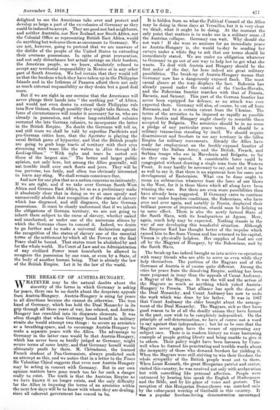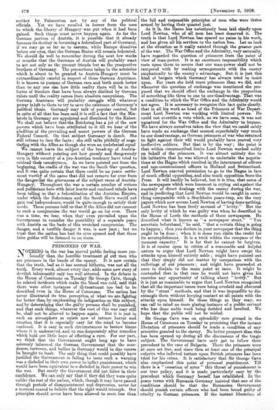THE BREAK-UP OF AUSTRIA-HUNGARY.
WHATEVER may be the natural doubts about the sincerity of the forms in which Germany is asking for peace, there can be no doubt about the desperate appeals from Austria-Hungary. Austria-Hungary is suing for peace in all directions because she cannot do otherwise. The iron hand of Germany, which has held the Dual Monarchy in its grip through all these years of war, has relaxed, and Austria- Hungary has crumbled into its disparate elements. It was often thought that when Germany found herself in military straits she would attempt two things : to secure an armistice as a breathing-space, and to encourage Austria-Hungary to make a separate peace with the Allies. The advantage to Germany in the latter case would be that Austria-Hungary, which has never been so hardly judged as Germany, might secure terms of some lenity, and that Germany herself would ultimately profit by them. AL Cheradame, the learned French student of Pan-Germanism, always predicted such an attempt as this, and we notice that in a letter to the Times Sir Valentine Chirol suggests that even now Austria-Hungary may be acting in concert with Germany. But in our own opinion matters have gone much too far for such a danger really to exist. The truth is that the Austrian Empire as we have known it no longer exists, and the only difficulty for the Allies in imposing the terms of an armistice within the next few days will be to know with whom they are dealing, since all coherent government has ceased to be. It is hidden from us what the Political Council of the Allies may be doing in these days at Versailles, but it is very clear we think, what it ought to be doing. At the moment the only point that matters is to make use in a military sense tf the Austrian collapse. Germany can wait. Why should she not wait ? If she were as anxious for an immediate peace as Austria-Hungary is, she would to-day be sending her envoys under a white flag to ask that our terms should be immediately stated. We are under no obligation whatever to Germany to go out of our way to help her to get what she wants. To deal with Austria and Hungary should be the first order of the day, for here indeed are great military possibilities. The break-up of Austria-Hungary means that Germany now has a dangerously exposed flank. The most casual glance at the map displays the fact. Bohemia has already passed under the control of the Czecho-Slovaks, and the Bohemian frontier marches with that of Prussia, Bavaria, and Saxony. This part of the German frontier has never been equipped for defence, as no attack was ever expected there. Germany will also, of course, be cut off from Rumania, and to a certain extent from the Ukraine. The terms of the armistice to be imposed as rapidly as possible upon Austria and Hungary ought closely to resemble those accepted by Bulgaria. The armistice should be in no sense a pledge of any particular peace terms. It should be a military transaction standing by itself. We should require disarmament and freedom to use any territory in the fallen Empire for military movements. Already the Allies have ready for employment on the freshly exposed frontier of Germany the Italian Army, and the British, French, and Serbian troops who are in Macedonia and Bulgaria, so far as they can be spared. A considerable force could be congregated without drawing a single man from the Western Front. It may hardly be necessary to say, and yet it may be as well to say it, that there is no argument here for some new development of Easternism. What can be done ought to mean no subtraction whatever from the force of our blows in the West, for it is these blows which all along have been winning the war. But there are even more possibilities than have already been suggested. If Germany cares to continue the war under hopeless conditions, the Bohemians, who have over and over again, and notably in Russia, displayed their brilliant powers of improvisation, should soon be helping us to some effect. There is also the newly formed State of the South Slays, with its headquarters at Agram. Here, again, much help may be expected. Nothing stands in the way of our developing this wonderful situation. Although the Emperor Karl has thought better of the impulse which caused him to flee from Vienna and has returned to his capital, Vienna is physically helpless. Her supplies of food are cut off by the Magyars of Hungary, by the Bohemians, and by the South Slays.
The break-up has indeed brought us into active co-operation with many friends who are able to serve us even while they help themselves. The position of the Magyars and of the Germans of Austria is of course quite different. Among the cries for peace from the dissolving Empire, nothing has been more poignant in irony than the appeals of Count Andrassy, a Magyar of the Magyars. It was the will and the action of the Magyars as much as anything which yoked Austria- Hungary to Prussia. That alliance has spelt the doom of the Dual Monarchy, and Count Andrassy has now to undo the work which was done by his father. It was in 1867 that Count Andrassy the elder brought about the arrange- ment of the Dual Monarchy. The Magyars, sick as they have good reason to be of all the deadly unions they have formed in the past, now wish to be completely independent. On the principle of self-determination, we have of course not a word to say against that independence ; but let us be sure that the Magyars never again have the means of oppressing any subject race. There is in modern history no more harrowing example of people getting liberty and being unable to give it to others. Their policy might have been foreseen by Crom- well when he framed his penetrating and terrible words about the incapacity of those who demand freedom for yielding it. When the Magyars were still striving to win their freedom the whole sympathy of the British people went out to them. When Louis Kossuth, the great Hungarian patriot and orator, visited this country, he was received not only with acclamation but with something like personal affection. People were entranced by hearing him speak the English of Shakespeare and the Bible, and by his grace of voice and gesture. The reception of this Hungarian Demosthenes was matched only by the subsequent worship of Garibaldi in this country. It was a popular freedom-loving demonstration encouraged neither by. Palmerston nor by any of the political officials. Yet we have recoiled in horror from the uses to which the liberty of Hungary was put when it had been gained. Such things must never happen again. As for the German portion of. Austria, it is possible that it already foresees its destiny in becoming a federalized part of Germany, if we may go so far as to assume, while Europe dissolves before our eyes, that the German States will remain federated. We should do well to remember during the next few weeks or months that the Germans of Austria will probably want to act not only as the present friends but as the prospective brothers of Germany. The precautions taken in the armistice which is about to be ranted to Austria-Hungary must be extraordinarily careful in respect of these German Austrians. It is known to persons of German race and birth much better than to any one else how little reality there will be in the forms of freedom that have been always disliked by German rulers until the reality comes from absolute compulsion. The German Austrians will probably struggle with whatever power is left to them to try to save the existence of Germany's political ideals. Germany may talk of popular control, but in spite of all that has been said it is still a fact that the Min- isters in Germane are appointO and dismissed by the Kaiser. We shall not believe that the Reichstag has a jot of the new powers which have been attributed to it till we hear of the abolition of the prevailing and secret powers of the German Federal Council. On that subject Germany is dumb. She still refuses to face the facts ; she still talks pitifully of nego- tiating with the Allies as though she were an undefeated equal We cannot leave the subject of the break-up of Austria- Hungary without pointing out how grossly and dangerously men in this country of a pro-Austrian tendency have tried to mislead their countrymen. As we have pointed out from the beginning, the cradle of the war was the South Slav question, anad it was uite certain that there could be no peace settle- ment worth of the name that did not remove for ever from the danger- the grievances of the subject races of Austria- Hungary. Throughout the war a certain number of writers and politicians here with faint hearts and confused minds have been telling us that a federalization of the Austrian Empire, under which the Bohemians and the South Slays would not gain real independence, would be quite enough to satisfy their needs. These persons told us that if the Allies did not consent to such a compromise the war would go on for ever. There was a time, we fear, when they even prevailed upon the Government to consider the possibility of a separate peace with Austria on the basis of this wretched compromise. The danger, and a terrible danger it was, is now past • but we trust that the nation has had its eyes opened and that these false guides will be:listened to no more.



































 Previous page
Previous page